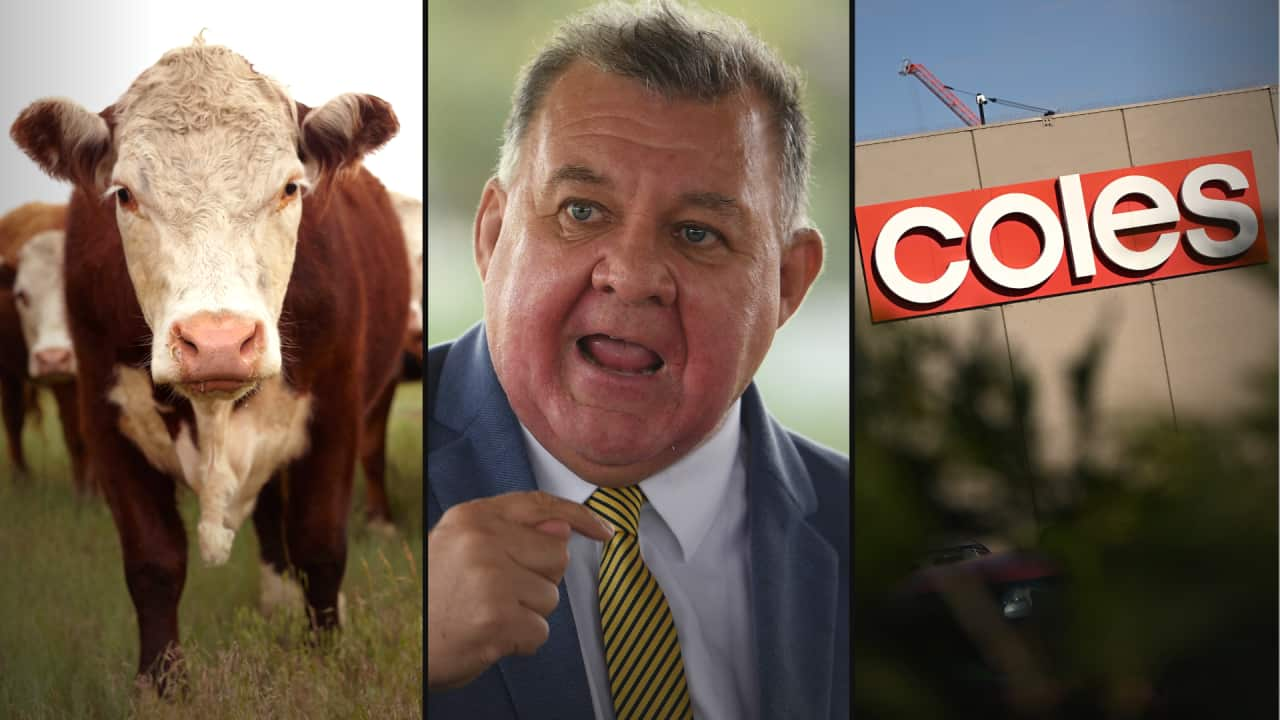Some Australian shoppers have threatened to boycott Coles amid an online firestorm about the supermarket’s use of a cattle feed supplement that aims to reduce methane emissions from cows.
Former federal politician Craig Kelly was among those who raised concerns on social media this week that some of Coles’ beef suppliers were adding Bovaer to their cow feed, saying he would avoid buying meat from there.
Alongside a screenshot of a Coles press release from November last year when it announced more of its suppliers would be using the supplement, he questioned whether the supermarket was “trying to mislead the public about the safety of the product”.
Coles is among the companies selling beef from suppliers which use Bovaer. Source: AAP
Kelly, who’s , also falsely claimed Bovaer was “unapproved” for use in Australia, adding it was “only being administered because of the Net Zero insanity in the belief that if we stop cows from farting we will avoid bad weather”.
Bovaer has sparked online debate in the United Kingdom, as well, after dairy company Arla Foods last week announced it would trial the use of the supplement across 30 British farms.
So what exactly is Bovaer, why is it being used by meat and dairy producers around the world, and is there any truth in the claims made by Kelly and others online?
What is Bovaer?
Bovaer is a cattle feed additive that suppresses the enzyme that triggers the production of methane — a gas that contributes to climate change — in cows.
The supplement is broken down as part of the animal’s natural digestive process, meaning it’s not present in any beef or dairy products.
Bovaer has been the subject of over 100 on-farm trials in more than 20 countries and dozens of peer-reviewed scientific studies, which found that on average, it reduced methane emissions by 45 per cent from beef cattle and 30 per cent from dairy cows.
DSM-Firmenich, the Swiss-Dutch company that manufactures Bovaer, said all trials and studies on the supplement showed it was “proven safe” for consumers, animals, and farmers.
Search interest for Boaver has increased over recent days, despite development starting in 2010.
Why is Coles using Bovaer?
Coles announced in November last year it would be expanding its use of Bovaer, following “two successful trials” in Australia that found the supplement reduced cattle methane emissions by at least 50 per cent.
The supermarket said three of its Coles Finest Carbon Neutral Beef suppliers were now using the supplement in their cattle feed.
“We were very encouraged by the results of our Bovaer trials and have used the findings to introduce the supplement to some of our beef suppliers to help them lower emissions on farm and help to reduce our Scope 3 emissions,” Coles’ livestock sustainability and innovation manager Maria Crawford said at the time.
“We’re looking forward to expanding the use of this innovative supplement to more of our Coles Finest certified carbon-neutral beef suppliers and continuing the important research to help support the beef industry’s aspiration of carbon neutrality by 2030 as well as Coles’ sustainability ambitions.”
Scope 3 refers to greenhouse gas emissions that are not produced by a company but which the company is indirectly responsible for.
SBS News asked Coles to respond to the recent claims made by Kelly and others online.
A Coles spokesperson said that the supermarket “prioritises food safety and animal welfare” and was “committed to improving the sustainability” of its business.
Bovear has been extensively researched over the past 15 years and approved by leading food safety organisations
SBS News understands none of the livestock producers who supply meat to Woolworths use Bovaer.
SBS News has contacted Aldi for comment.
Is Bovaer approved for use?
Bovaer has been authorised for sale in over 65 countries, including Australia, Canada, the European Union, and the UK, according to DSM-Firmenich.
Meat & Livestock Australia (MLA), the industry’s peak marketing and research body, has completed three studies of Bovaer in partnership with industry and universities and is conducting two more.
It said it had consulted with the Australian Pesticides and Veterinary Medicines Authority and the Department of Agriculture and Fisheries on all required approvals for its research.
MLA’s managing director Michael Crowley said Australian customers could “rest assured” that any beef they buy is safe to eat as Bovaer “does not pass into meat products”.
“Food safety and care for the environment are Meat & Livestock Australia’s top concerns,” he said.
The claims surrounding Bovaer
Kelly wrote online that Bovaer was “toxic” and “unapproved”, adding: “I’d prefer beef from cattle that fart naturally, rather than cattle dosed with new unapproved drugs to reduce their farts.”
He has also linked to a Japanese Food Safety Commission report on 3-Nitrooxypropanol (3-NOP), which is sold as Bovaer, that found a decrease in sperm counts. The study was carried out on mice, rats and dogs but not cattle. The report also said its findings were not unexpected and also did not recommend against Bovaer’s use.
The National Farmers Union in the UK said: “When used as recommended, Bovaer is designed to break down in the cows’ digestive systems and quickly decompose into naturally occurring compounds already present in the rumen. As such, the product is not present in the milk or meat from an animal and there is no exposure to consumers.”
And Alastair Hay, professor of Environmental Toxicology at the University of Leeds, said: “There is no evidence to suggest that at the doses approved for use in animals that the additive is a risk to humans through consumption of milk.
“Given that the majority of humans eat meat and consume dairy products any action which can be shown to limit methane emissions deserves serious consideration and use of 3-NOP seems one such measure.”


